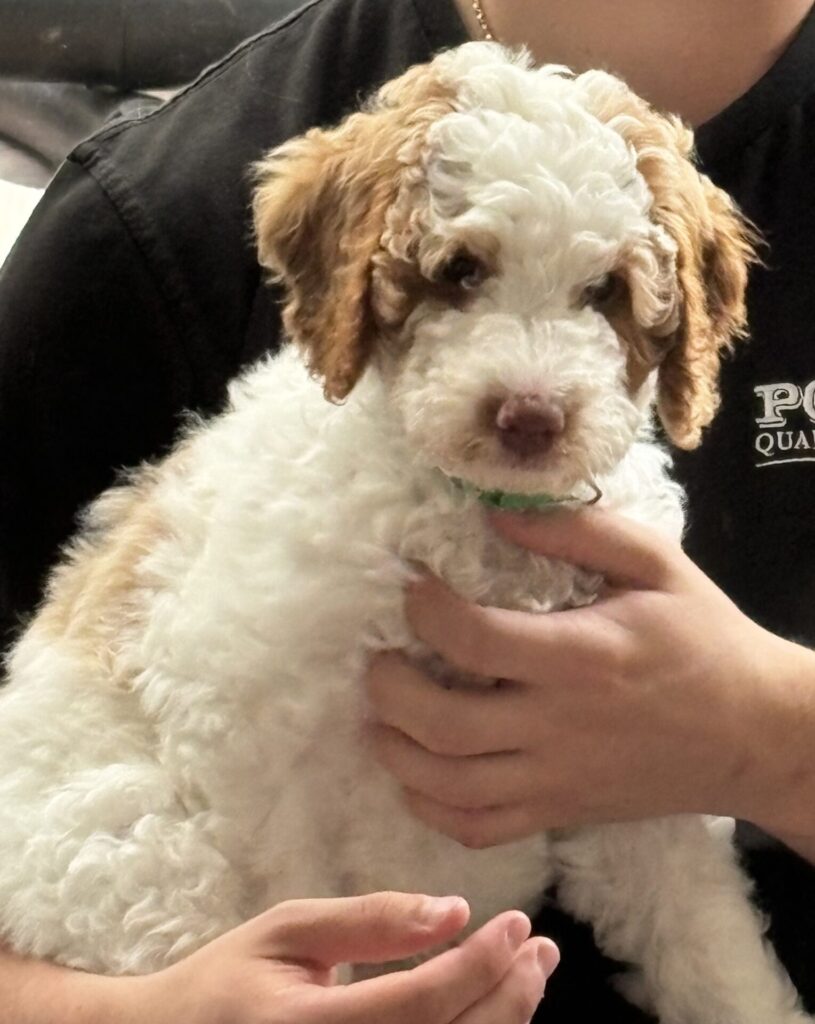A new member of the family – School Dog
Dear Parent/Carer,
I am writing to inform you that we will soon be adding a new member to our school community after Easter.
Rory is a Labradoodle puppy who has recently joined Mrs Hunters family. He has been chosen to be our family dog and following discussions with governors and staff we would like him to become our school dog.
Rory is 9 weeks old and is ready to start spending small amounts of time in school to start his socialisation with plans for him to join us full time after the Summer holidays.
We have chosen this breed for the following reasons:
The breed does not malt – their coat is non-allergenic, meaning there is a reduced risk of allergic reactions.
The breed is known to be child-friendly, lively, gentle mannered and affectionate, yet sensitive.
The breed is known to be highly intelligent and respond excellently to training.
We wish to reassure parents that we have undertaken a significant amount of research into why Rory would benefit our school. Some of the many benefits of having a school dog include the following:
Cognitive development – building a companionship with a dog helps children stimulate their memory, problem-solving and game-playing skills. Having a school dog is known to increase enthusiasm for, and enjoyment of animals, which motivates children to think and learn.
Social skills – dogs provide a mutual topic for conversation with others, and encourage responsibility, wellbeing and focused interaction with others.
Emotional skills – dogs improve self-esteem, acceptance from others and are known for improving moods. Dogs can also help children develop compassion and respect for other living things and can reduce children’s anxiety. Building respect can improve children’s relationships with each other, parents and teachers and shows them how to nurture and care for another living thing. If any children are suffering from bereavement or are particularly sad, dogs can provide children with comfort and friendship.
Physical development – interaction with dogs is known to reduce blood pressure, provide tactile stimulation, assist with pain management and give motivation for children to move and walk.
Reading – school dogs are known to help children with their reading and literacy skills, through their calming presence and ability to listen to children read without being judgmental or critical. Children can build their confidence to read aloud to others through having a school dog.
School community – having a school dog builds the sense of a family environment and togetherness.
When he is at a suitable age and when he has completed his dog training, we will have Rory assessed by the Therapy Dogs charity to train as a therapy dog, but he does need to familiarise himself with our school prior to this.
Rory will spend most of his time in the head teacher’s office.
A suitable bed, food, water and cleaning supplies for Rory will be provided, and he will be sufficiently toilet-trained. I must stress that pupils will not be expected to clean up any dog mess, and we will ensure that the school grounds are kept clean at all times.
Whenever Rory is being walked around the school, he will always be with an adult and have a short lead to ensure he is controlled at all times.
PLEASE NOTE: Rory will be classed as a working dog with permission from the Governors to be in school. The Leeds City Council rule that no dogs are allowed on school premises remains in force and we ask all dog owners to abide by this.
I understand that many parents will have concerns regarding bringing a school dog onto the premises, and I would like to use this post to provide you some reassurance. A full risk assessment to ensure that any hazards can be adequately controlled has been undertaken. The risk assessment is in the school website for you to view should you wish to access it.
Below, I have listed some concerns which I believe some parents may have:
My child is allergic to dogs and I don’t want them to have an allergic reaction
As previously mentioned, we have chosen a labradoodle breed, which has a non-allergenic coat and does not malt, meaning there is a significantly reduced risk of an allergic reaction. If, however, you would still prefer your child not to come into contact with Rory please let the school office know by Friday 27th June, we will accommodate your request and ensure that arrangements are in place. It is outlined in the risk assessment what the hygiene practices will be in place – such as cleaning of hands and the environment before and after coming into contact with Rory.
Will the dog be properly cared for?
Rory will be subject to a rigorous grooming process to prevent the risk of infection or disease. Rory will be kept in the headteacher’s office during the day and will have adequate supply of food and water.
My child is scared of dogs
We understand that some children may be fearful of dogs. Labradoodles are known for being extremely child-friendly and Rory will provide the opportunity for children to overcome their fears, with their parents’ permission. The training that Rory will undergo will ensure that he is well-behaved, gentle and calm around children.
We will send out further information on Rory’s progress and details of his role in the future. We hope that children from the school will gain a great deal of enjoyment from having a school dog and that Rory will become a welcome addition to our school.
I hope to have provided reassurance to any concerns you may have via this letter; however, if you have any further questions, please feel free to contact me.
Kind regards
Lynne Hunter

